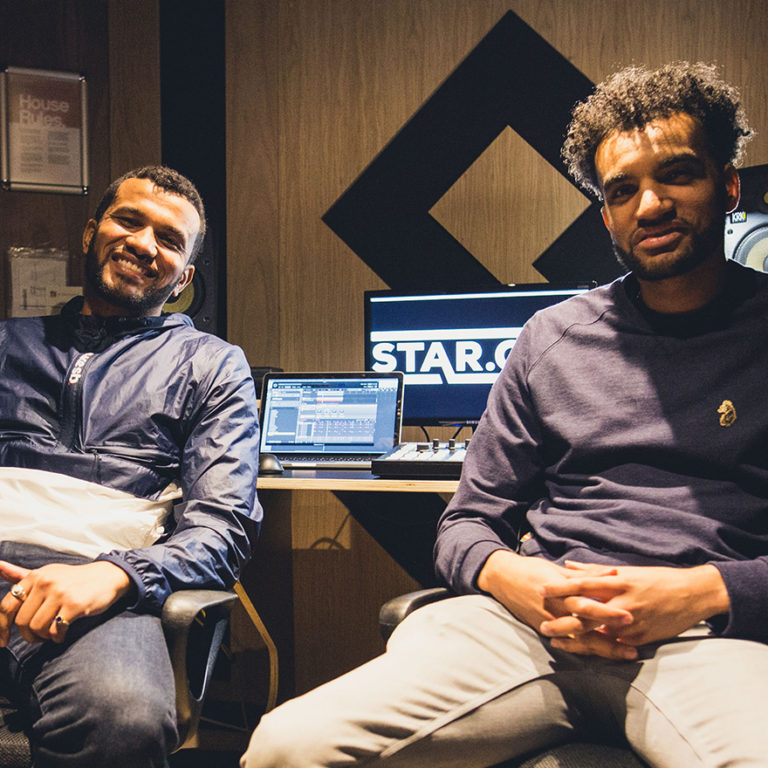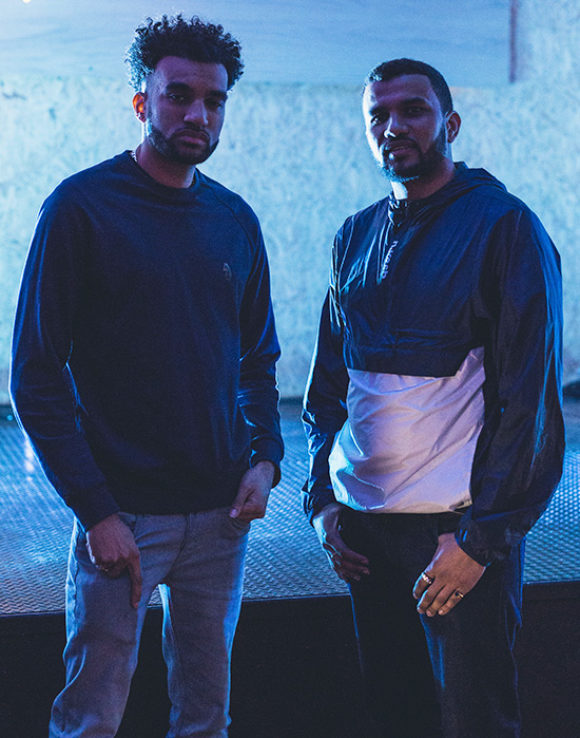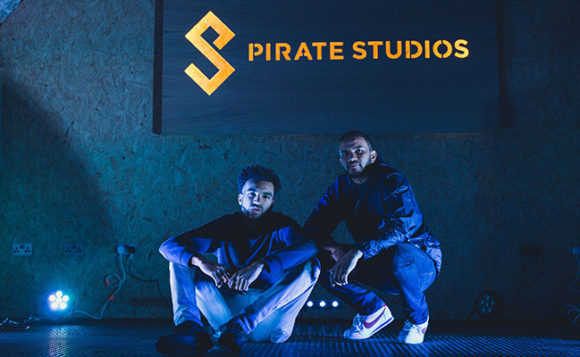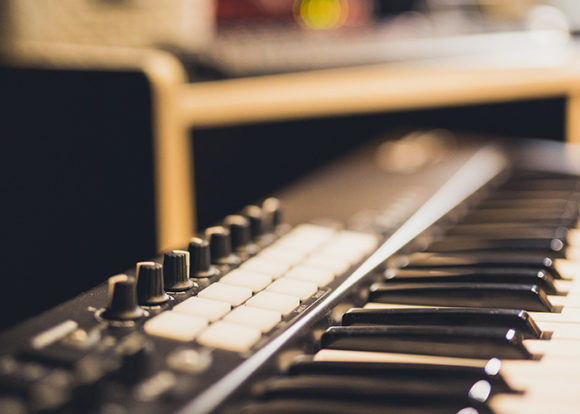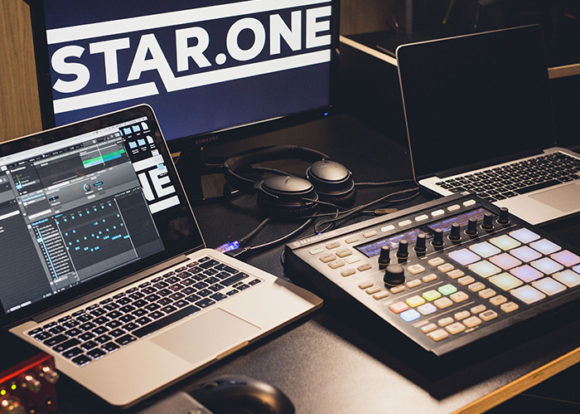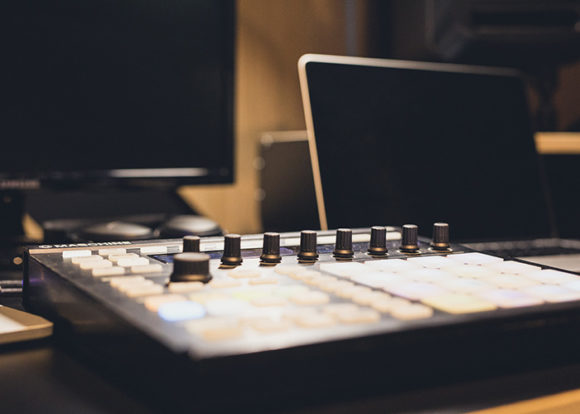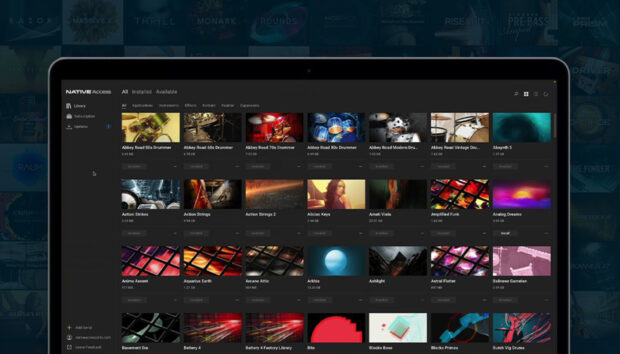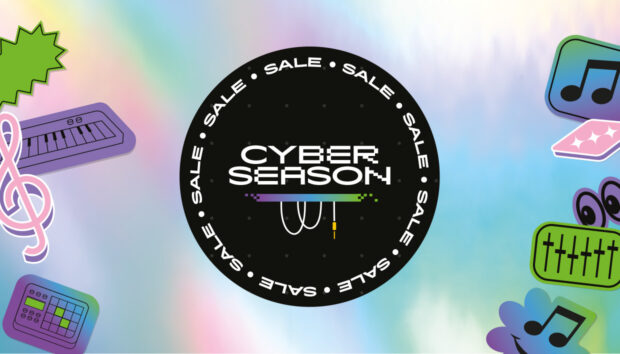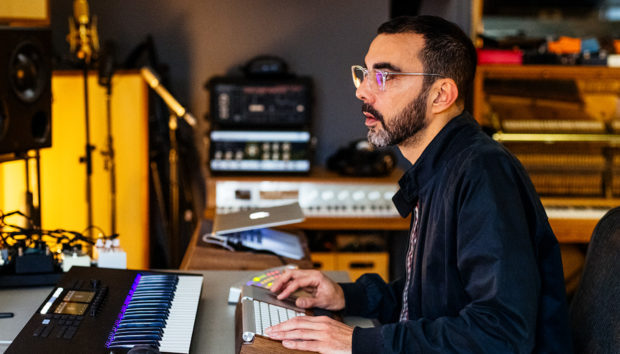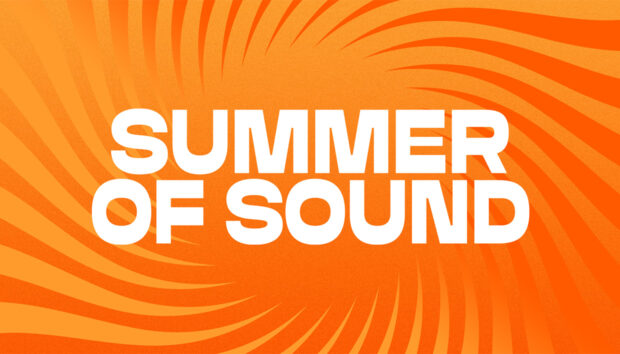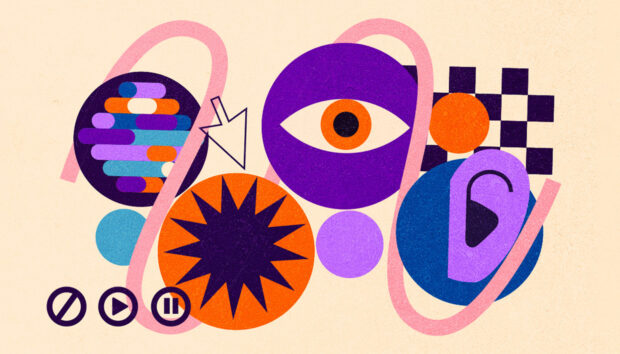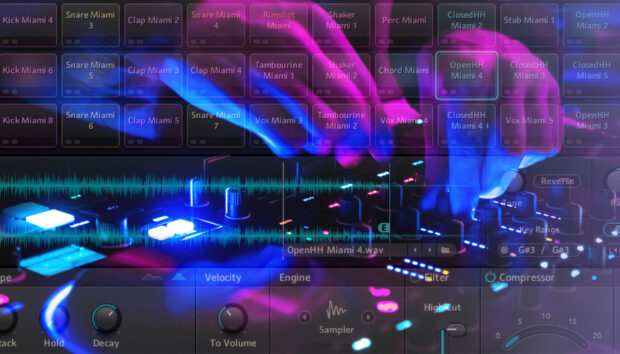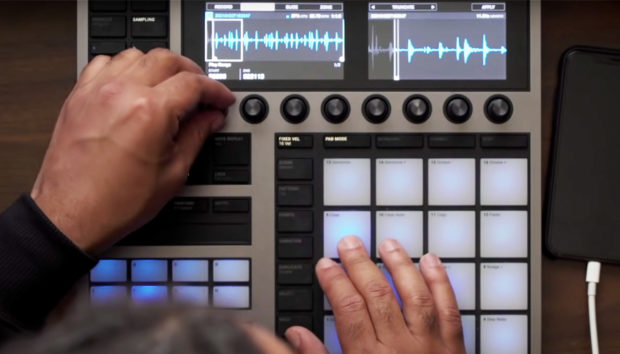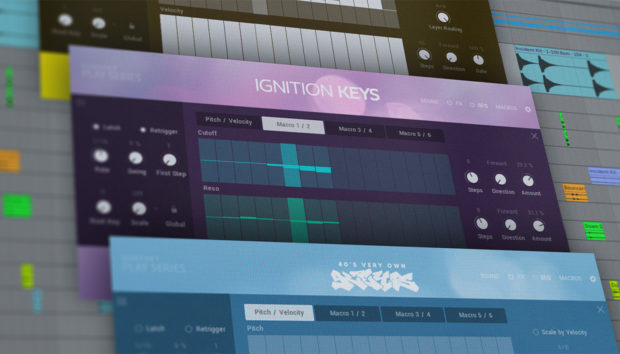Meet UK’s grime up-and-comers of the moment Adam and Joe Wilson aka Star.One. The two brothers draw inspiration from all corners of the musical landscape and transform it into their own bass-driven sound. Heavily influenced by their father’s record collection, blended with UK hip hop and later on grime, garage, and drum and bass, they joined forces for their official debut mixtape earning interest from BBC’s Radio One. For Native Instruments the duo talk about beginnings in music production, moving from the MPC to MASCHINE, and creating a buzz by using Instagram stories.
It’s easier being brothers
Adam: Early on, we were listening to what dad used to – a bit of Motown and reggae. He had five albums he used to play all the time, Lauryn Hill, Babyface, The Fugees, Joe and Bob Marley – and they’d be on repeat. Oh, and Sting, let’s throw that one in there, but we’ve blanked that from our memories. UK hip hop was one of the main things that I was into, then garage, grime and drum and bass followed. But what we try to do is mix all those elements up.
Joe: I remember a couple of times coming up to my room and catching Adam playing on my decks. I think it’s easier being brothers when you’re in a band, because I’m always right [smiles]. We’ve been arguing for a lifetime, so if one of us says something one day, the next day it’s forgotten.
Adam: It wasn’t until we were in our twenties that we properly connected on a musical level. I know how Joe will react to things, and we know that the end goal is the same – it’s just about how we get there.
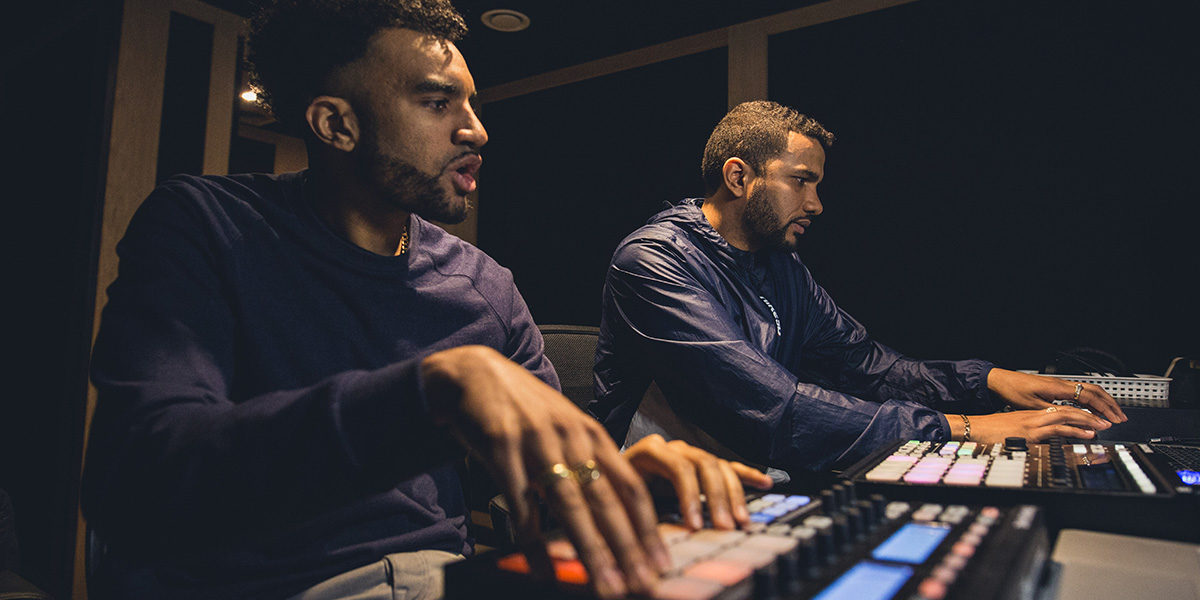
Entry intro production
Joe: I originally started by producing the beats I rapped on. Then I moved away from production for a bit, studied at college and went back to it properly about eight years ago. I started off using an Akai MPC2000XL, sampling loads of old vinyl because dad had a massive vinyl collection. That’s why I love Native Instruments’ Maschine so much, because it’s like a modern upgrade of the Akai sampler.
Adam: It took us a few years to work out our sound and we’re only really defining it now. We try things out all the time, but a lot of it depends on who we’re working with. At the moment, we’re really excited by the new breed of MCs coming through and I think our sound is more aligned to what’s happening in the UK landscape. We’ve also got the garage influences coming back, the Afro sound and dancehall, so we like to reflect that, but in our own way.
Pirate studios
Adam: Last year, we were approached by Pirate Studios to be ambassadors for the company, because they had seen a lot of our DJ videos. They started building production suites and wanted us to use them. We’ve been using this studio in Notting Hill for the last three months, and also one in Earlsfield. They’re a great company with some really cheap DJ rooms, rehearsal studios and productions suites that are top of the range.
Joe: My studio’s in Kent, so it’s a bit harder to access for other artists. But it’s ideal for us, because I can make beats at home and then come here and start recording. This is where we do most of our sessions with other artists.
Adam: Right now, we’re growing through social media. Instagram is like new-age TV to us; our own personal TV channel. We did an Instagram story yesterday on how we make beats just using Maschine. I came up with a loop, Dropbox-ed it to Joe, he did his bit and then we sent it back and forth. That video was the biggest interaction we’ve ever had on social media, and people thought it was great to see how we were making stuff, so we’re looking to do more of that. I bought Maschine and Komplete at the same time; then Joe got jealous of it and [also] bought Maschine.
From the Akai MPC to MASCHINE
Joe: Because we come from an Akai MPC background, we clocked Maschine because it’s got pads, and instead of me faffing around with all these 32MB cards and loading them onto the MPC, I can load up a drum kit in Maschine with four clicks and there’s my hip hop drums, garage drums and other sounds. It’s so quick compared to the MPC – even though that was my baby and I still use it in the studio occasionally. With Maschine, certain artefacts are not there, like the crackle you get from sampling vinyl, but then it has got emulators like the E-mu SP-1200 sampler. I like to degrade sounds quite a lot, and with Maschine you get those options.
Adam: I come at things from a DJ point of view and love working with loops and finding certain sounds that work. That’s why I love Maschine, because I’m not gifted when it comes to music theory, but I can come up with loops quite easily and work with samples using the different chord settings. That was a game changer and gives us a different aspect to our production that we didn’t have access to before.
Joe: I like catching a vibe, feeling the energy in the music and expanding on that. That works well because Adam will work with loops on Maschine and send me a batch of beats to take bits from and expand upon.
Adam: Sometimes we’ll use Machine as a plug-in in Logic, but I prefer to use it as a standalone. It probably comes from being a DJ, because I always like doing cue points and looping up different parts of tracks, and I think that translates well into production and using something like Maschine. When you’re in the zone, you’ve got to go for it, and sometimes I’ll make 10 loops in 20 minutes. I wish I could do that every day – but on those days when I’m not feeling so creative, I might mix a track instead.
Joe: I can start with a vocal sample or anything. Creatively, I just like to be able to move around very quickly. If I’m on the go, I’ll load up sounds on Maschine, but when I’m in the studio and in a more comfortable environment, I prefer to use Maschine as a controller – a tool inside Logic. What I do love about Maschine is how you can make a little loop, bounce it to audio and drag it into a different track. Then it becomes audio, so you’re sampling your own stuff as well. I used to be very heavily into sampling until I realised I could no longer clear them, but you can always make something completely different to the original source and use that for inspiration. My advice to people is to just get on it and start practicing – you’ve got to put the hours in and learn the gear like the back of your hand if you want to get the sound that you want.
Discover KOMPLETE
Joe: Native Instruments creates quality products. I think we got Komplete 9 first and then upgraded to 10. Then we got the Komplete Kontrol keyboard and were basically hooked. We started using Kontakt, especially Battery and Intakt, then found that Expansion’s Paradise Rinse and Caribbean Current were great for the type of sound we were making. Native Instruments know what they’re doing when they put sound packs together. They see things from the artists’ point of view, and because their stuff is so easy to get ideas from it allows me to get a sketch down within minutes.
Adam: Basically, there are so many sounds in Komplete that I think you can find stuff for any genre you’re operating in. Sometimes I do advertising briefs, and if I want Cuban drums, for example, there’s a plug-in for it. Whenever Native releases something new, I’ll check for it straight away. We’ve used sounds from Komplete on virtually every track we’ve ever made and their products are what we use the most on our day-to-day productions.
Joe: Software-wise, we love Output’s vocal engine Exhale – especially when I’m playing with lots of vocal loops and cuts. We’ll trigger those samples using the pads on Maschine, put a drum beat on and expand that idea out. Within Komplete, we love Kontakt because it has loads of great sounds. Massive is also a go-to – we like using Monark for sub bass sounds and we’re always using Alicia’s Keys and, more recently, West Africa’s sampled percussion instruments. We like using synth brass sounds too, so Komplete’s Symphony Series Brass often comes in handy. Brass can sound cheesy, but these actually pack a punch. Session Horns allows you to switch the pitch or change lines into different keys. We’ll use brass as hits or sometimes play those sounds over real instruments to add that live, human feel.
The future
Joe: We hope to start using Maschine more when we’re live on stage. We used it once when we did the Radio One set for triggering sounds and drum loops, so when we have an album out and are performing our own songs, we’ll definitely bring it in for our live performances.
Adam: At the moment we’re still working on releasing EPs and mixtapes. We’re building the hype and energy around us. We’ve waited this long to put out our first album, so there’s no harm in waiting a little longer.
Star.One’s ‘We Run The Show’ (Featuring Asher D X P Money) is available to buy now. photo credits: Kevin Lake








